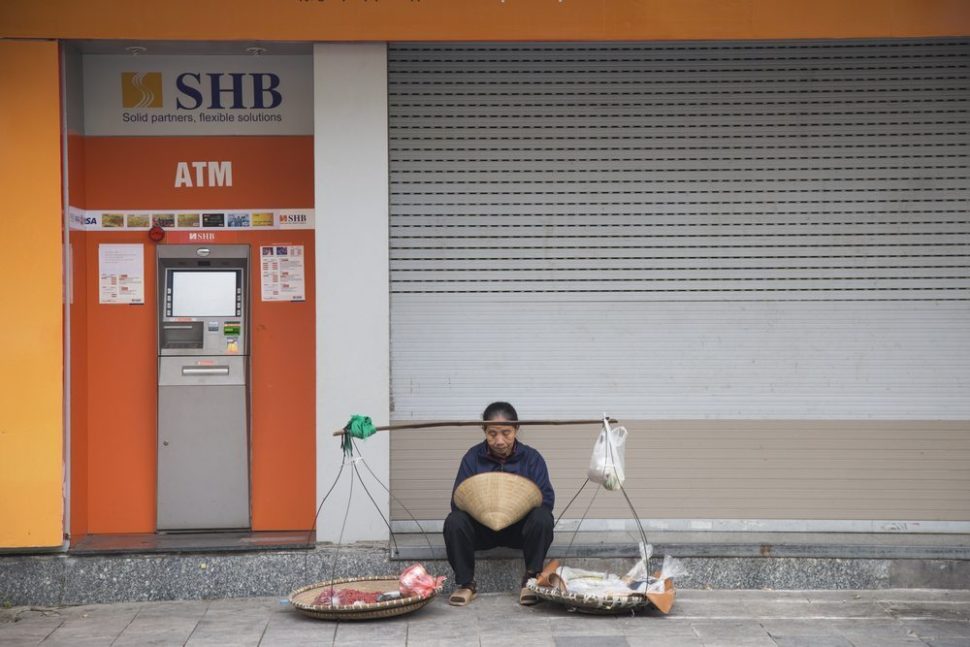Cryptocurrency has been a controversial solution to the economic problems several developed and developing countries are facing. Here we discuss both the risks and opportunities blockchain technologies bring.
The Bitcoin Argument
Even the “mere mention of Bitcoin evokes mixed response[s] among seasoned economists” according to NewsBTS. There are those who call Bitcoin revolutionary, while others discredit its potential, calling it a “giant pyramid scheme”.
Watch Forbes’ Video: Getting Rid Of Pocket Money
However, in places like Venezuela where people are living off a government-issued stipend that equates to about $6 per month Bitcoin has proved to be much more reliable than national banks for handling day to day transactions.
According to Crypto Coin News, the Venezuelan government “suddenly, unilaterally, [and] without any apparent due process” declared 100 Venezuelan Bolivar notes (worth around two cents in October of last year) to be completely worthless in December 2016.
This problem was almost certainly compounded by the three highly variable exchange rates Venezuelans must choose from (the elite market, the common market, and the widely used black market).
The end result? Even the highest denominations of the bolivar are now so worthless citizens of Venezuela have taken to weighing (rather than counting) their bills.
But Venezuela isn’t the only nation facing an imminent economic crisis.
According to Frisco d’Anconia, a West African native and writer for Crypto Coin News, Zimbabwe’s inflation rate was estimated at “an unimaginable 79.6 billion percent” by as early as 2008.
“This was the era where Zimbabwe bank notes varied from 10 to 100 Billion Zimbabwean dollars,” d’Anconia reflects.
By 2009, economic instability forced Zimbabwe to adopt the U.S. Dollar. However, without ready access to U.S. dollars, the Zimbabwean government created a strict daily withdrawal limit of just $50 per day.
Last year, the introduction of bond notes helped resolve hyperinflation somewhat but did nothing to fix the limited availability of currency. According to d’Anconia, daily withdrawal limits are still in place, and (depending on the bank) those limits could either fall even lower (to $30 a day) or banks could close their ATMs altogether (now a common practice).
Remember, these aren’t the only examples of hyperinflation throughout history.
If you remember seeing wheelbarrows filled with cash from the Weimar Republic following World War I, you should be able to recognize just how quickly an economic problem like this can turn into a social, global, and political disaster.
How can Cryptocurrencies Help?
Bitcoin isn’t the only cryptocurrency out there; As of today, there are over 824 unique cryptocurrencies participating in the e-commerce market.
In fact, the total market cap for cryptocurrency stands at: $48,567,465,937 USD
According to Forbes, many Venezuelans are turning to Bitcoin as an alternative. Some of the benefits of cryptocurrency they describe include:
- Greater ability for humanitarian donation to groups and individuals using Bitcoin
- Physical bank account no longer needed to send or receive Bitcoin
- Government officials can’t control the value of it
- Much smaller valuation shifts
- Some existing infrastructure (see: Venezuelan companies exclusively accepting payment in Bitcoin & Amazon’s Bitcoin policies)
That is not to say that Bitcoin (and other cryptocurrencies) currently possess optimal economic scaffolding.
As Forbes notes, cryptocurrency transaction fees can vary widely and (in the case of Bitcoin) are “far too high” to benefit developing nations. Platforms like BitSquare are free and decentralized, and there are not obvious transaction fees. However, banking fees and currency conversions will still eventually cost the buyer.
On the other hand, for some developed nations, Bitcoin is viewed as “too volatile”.
However, BTC News reports that “cryptocurrency has already proven its capabilities in the African continent by making financial services accessible to the unbanked and underbanked”.
Is Cryptocurrency Dangerous for National Economies?
A number of cryptocurrency critics, including economists and government officials, are weary of a hypothetical flaw in blockchain technology (the process that dictates cryptocurrency transactions) called a “51% Attack”. There is also a worry that quantum computers will present a security danger to cryptocurrency systems, but this is also still a hypothetical.
According to Investopedia, this attack leaves market participants open to:
“miners controlling more than 50% of the network’s mining hashrate, or computing power. The attackers would be able to prevent new transactions from gaining confirmations, allowing them to halt payments between some or all users. They would also be able to reverse transactions that were completed while they were in control of the network, meaning they could double-spend coins.”
Even though this attack is still theoretical–other similar hacks have been executed using Bitcoin in the past. As Joo Ian Wong, technology reporter for Quartz, remarks:
“The history of bitcoin exchanges is Darwinian, marked by abrupt failures triggered by security breaches. If you run a big bitcoin exchange, it’s usually a question of when, not if, your defenses will be breached.”
However, many cryptocurrencies have created potential workarounds to safeguard against excessive mining.
In fact, Coin Market Cap currently shows 380 cryptocurrencies that are “not minable”. Only 16 of the 824 known cryptocurrencies have been significantly mined in the past.
The current market cap for cryptocurrency is $48,567,465,937 USD.Click To TweetMoreover, mining and cryptocurrency exchange can be difficult for most people to execute in such a complex way. They must know how to manipulate bitcoin marketplaces and currency exchanges in highly intricate ways–something the major population of a developing country would be hard pressed to find time to do.
Still, there are several possible solutions for improving global cryptocurrency security measures including:
- Cryptocurrency brand partnership with World Bank
- UN protections on blockchain technologies
- Cryptocurrency brand creation for government entities
Because the World Bank works largely with poor and developing countries, what this partnership could mean is that instead of working on an individual competitive scale for currency rates, these developing countries could pool their currency values and participate in a fairer economic market.
Could Cryptocurrencies Prevent Brexit?
In addition to assisting developing nations to stabilize their currency, cryptocurrency could ease or prevent international conflicts.
In 2015, Greece was scheduled to rollout 1,000 Bitcoin ATMs in an effort to relieve their ongoing financial crisis.
However, that proposed rollout appears to have been either delayed or canceled altogether. Right now, there are only two Bitcoin ATMs available in all of Greece, according to Bitcoin ATM Radar.
In fact, The Guardian reports that negotiations between Athens and their creditors have come to a grinding halt. As Helena Smith reports that:
The possibility of Grexit, or euro exit, has re-emerged and bond yields have soared. The yield on two-year Greek government bonds has risen from 6% to 10% in less than two weeks as spooked investors have dumped their holdings. And the shrill rhetoric last seen at the height of the crisis in 2015 has returned.
As in the case of Zimbabwe, Argentina, and Venezuela, Greece could potentially pull itself back from the brink of disaster by incorporating cryptocurrency into their economy.
Since negotiations are at a standstill, working with the World Bank & the United Nations to set guidelines on the usage of cryptocurrencies could very well spell a fresh start for Greece’s the Grecians’ turbulent economic and social climate.



















All thanks to Mr Jeff Silbert for restoring me from my lost which i made to fake account management online. i was introduce to a fake platform by someone I came across online and this made me lose over $7,500 i almost lost all I have but thank god i w3as able to recover my funds by Mr. Jeff Silber. I think you can reach him if you need help email him Jeffsilbert39 gmail com or
WhatsApp +84 94 767 1524. trust me he is super nice man.